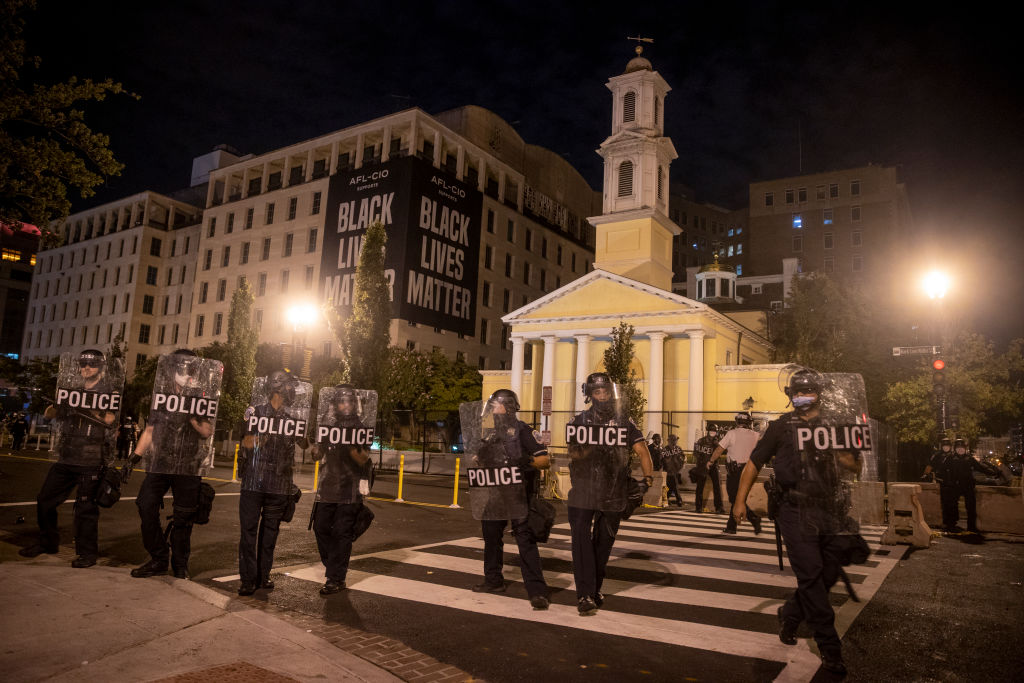Woodward asked Trump if he tried to understand 'the anger and pain' of Black Americans. Trump mocked him.


A free daily email with the biggest news stories of the day – and the best features from TheWeek.com
You are now subscribed
Your newsletter sign-up was successful
President Trump pretty clearly wasn't among the scores of Americans who sent books on anti-racism and white "fragility" to the top of the best-seller lists after the documented police killing of George Floyd sparked a new evaluation of institutional and systemic racism in the U.S.
In a June 19 conversation with Trump, journalist Bob Woodward noted that he and the president come from "white, privileged" backgrounds, suggested that blinded them to the realities Black Americans face, and asked Trump if he was trying to "understand the anger and the pain, particularly, Black people feel in this country," Woodward reveals in his forthcoming book, Rage. "No," Trump replied, in a tone Woodward described as mocking and incredulous. "You really drank the Kool-Aid, didn't you? Just listen to you. Wow. No, I don't feel that at all." (You can listen to the audio of that exchange at The Washington Post.)
Trump instead pointed to the pre-pandemic jobless numbers for Black Americans and claimed to Woodward that he's done more for the Black community than any president since slave-emancipator Abraham Lincoln. On July 8, Trump told Woodward again he's "done a tremendous amount for the Black community," adding, "And, honestly, I'm not feeling any love."
The Week
Escape your echo chamber. Get the facts behind the news, plus analysis from multiple perspectives.

Sign up for The Week's Free Newsletters
From our morning news briefing to a weekly Good News Newsletter, get the best of The Week delivered directly to your inbox.
From our morning news briefing to a weekly Good News Newsletter, get the best of The Week delivered directly to your inbox.
But Trump isn't a total racism denialist, Woodward notes. In a June 22 chat, he asked Trump if he thinks "systematic or institutional racism in this country," Woodward writes, and Trump replied, "Well, I think there is everywhere," and "probably less here than most places," and the racism that does exist in the U.S. is "unfortunate."
A free daily email with the biggest news stories of the day – and the best features from TheWeek.com
Peter has worked as a news and culture writer and editor at The Week since the site's launch in 2008. He covers politics, world affairs, religion and cultural currents. His journalism career began as a copy editor at a financial newswire and has included editorial positions at The New York Times Magazine, Facts on File, and Oregon State University.
-
 What is the endgame in the DHS shutdown?
What is the endgame in the DHS shutdown?Today’s Big Question Democrats want to rein in ICE’s immigration crackdown
-
 ‘Poor time management isn’t just an inconvenience’
‘Poor time management isn’t just an inconvenience’Instant Opinion Opinion, comment and editorials of the day
-
 Bad Bunny’s Super Bowl: A win for unity
Bad Bunny’s Super Bowl: A win for unityFeature The global superstar's halftime show was a celebration for everyone to enjoy
-
 Rubio boosts Orbán ahead of Hungary election
Rubio boosts Orbán ahead of Hungary electionSpeed Read Far-right nationalist Prime Minister Viktor Orbán is facing a tough re-election fight after many years in power
-
 Key Bangladesh election returns old guard to power
Key Bangladesh election returns old guard to powerSpeed Read The Bangladesh Nationalist Party claimed a decisive victory
-
 Epstein files topple law CEO, roil UK government
Epstein files topple law CEO, roil UK governmentSpeed Read Peter Mandelson, Britain’s former ambassador to the US, is caught up in the scandal
-
 Iran and US prepare to meet after skirmishes
Iran and US prepare to meet after skirmishesSpeed Read The incident comes amid heightened tensions in the Middle East
-
 EU and India clinch trade pact amid US tariff war
EU and India clinch trade pact amid US tariff warSpeed Read The agreement will slash tariffs on most goods over the next decade
-
 Israel retrieves final hostage’s body from Gaza
Israel retrieves final hostage’s body from GazaSpeed Read The 24-year-old police officer was killed during the initial Hamas attack
-
 China’s Xi targets top general in growing purge
China’s Xi targets top general in growing purgeSpeed Read Zhang Youxia is being investigated over ‘grave violations’ of the law
-
 Panama and Canada are negotiating over a crucial copper mine
Panama and Canada are negotiating over a crucial copper mineIn the Spotlight Panama is set to make a final decision on the mine this summer
